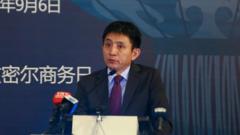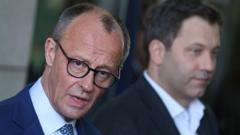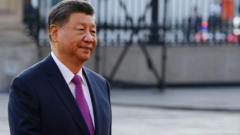In the wake of Friedrich Merz's election as Germany's next chancellor, the country faces significant infrastructure challenges. The recent approval from Parliament for increased spending, bypassing traditional constitutional limits, raises hopes for revitalization. Merz has committed to borrowing up to 500 billion euros, earmarking substantial funds for urgent infrastructure projects. This financial move, essential for repairing essential public structures, aims to address a troubling history of neglect stemming from previous administrations.
Germany's Infrastructure Crisis: New Measures Under Friedrich Merz

Germany's Infrastructure Crisis: New Measures Under Friedrich Merz
As Friedrich Merz takes on the chancellorship, Germany anticipates a major shift in infrastructure priorities, challenging decades of underinvestment.
The selected 500 billion euros investment plan includes approximately 200 billion euros dedicated to states and a renewed climate fund. Moreover, around 150 billion euros are set aside for direct infrastructure improvements, a pressured change driven by the urgent need for modernization. Observers caution, however, that even modern military hardware faces challenges traversing decrepit infrastructure, underlining the urgency of these measures.
The historical backdrop of Germany's situation reveals a reluctance to incur debt, resulting in persistent underfunding of critical areas. The lifting of the debt brake could be pivotal in moving the country forward, provided that effective implementation follows. As Merz's term unfolds, his administration will need to balance investments with sustainable growth, navigating between enhancing military capabilities and repairing the nation's faltering bridges and roads.
Ultimately, Merz's approach will test the resolve of Germany's commitment to public infrastructure, relying on a well-coordinated strategy that merges defense and domestic improvement. The outcome could redefine not just the condition of bridges, roads, and highways, but also reinforce Germany’s standing as a leader in industrial and economic strength.
The historical backdrop of Germany's situation reveals a reluctance to incur debt, resulting in persistent underfunding of critical areas. The lifting of the debt brake could be pivotal in moving the country forward, provided that effective implementation follows. As Merz's term unfolds, his administration will need to balance investments with sustainable growth, navigating between enhancing military capabilities and repairing the nation's faltering bridges and roads.
Ultimately, Merz's approach will test the resolve of Germany's commitment to public infrastructure, relying on a well-coordinated strategy that merges defense and domestic improvement. The outcome could redefine not just the condition of bridges, roads, and highways, but also reinforce Germany’s standing as a leader in industrial and economic strength.





















